BagPoem
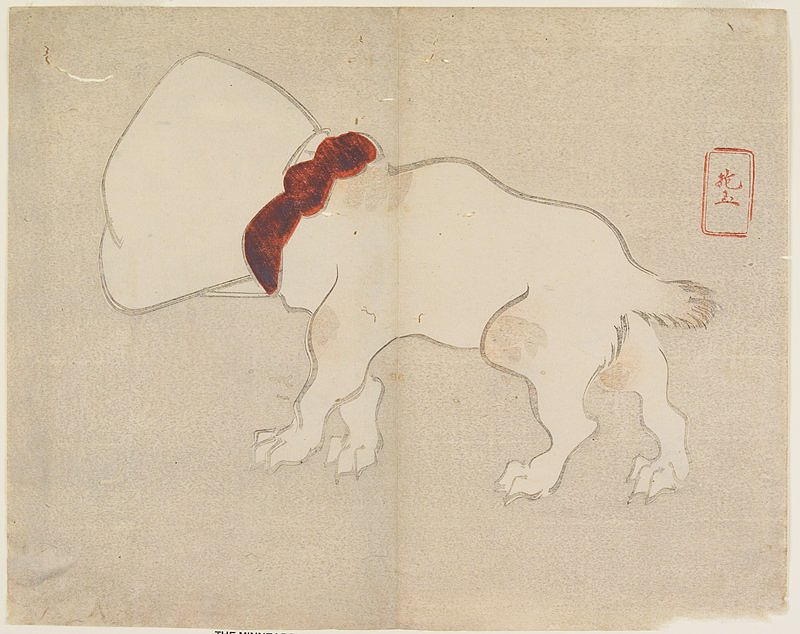
Yamada Hōgyoku: Dog with Bag Over its Head (1830s)
" … there could be worse fates than smothering on tradition."
Who knows where traditions get started? Who knows where they end? Some arise from innocent mistakes. Others seem more tenacious habit than anything resembling the presence of grace. A few seem genuinely sacred, in that neglecting to observe them seems more sin than oversight. Family traditions might hold no known origin, like the old apocryphal story about the preparation of the Easter ham, which had always included the traditional step of cutting one end off the ham. The youngest great-granddaughter asked her mother why she cut off the end of the ham and was told, "Because that's the way my mother prepared it." So the great-granddaughter asked her grandmother the same question and received the same answer. She finally asker her great-grandmother, who had apparently started the tradition way back during the Great Depression. "Because the only pan I owned was too small to hold the ham, Great-grandmother explained. Some traditions seem like metastasized necessities.
In my family, one tradition began as a small shortcoming.
SynchronicitySwarm
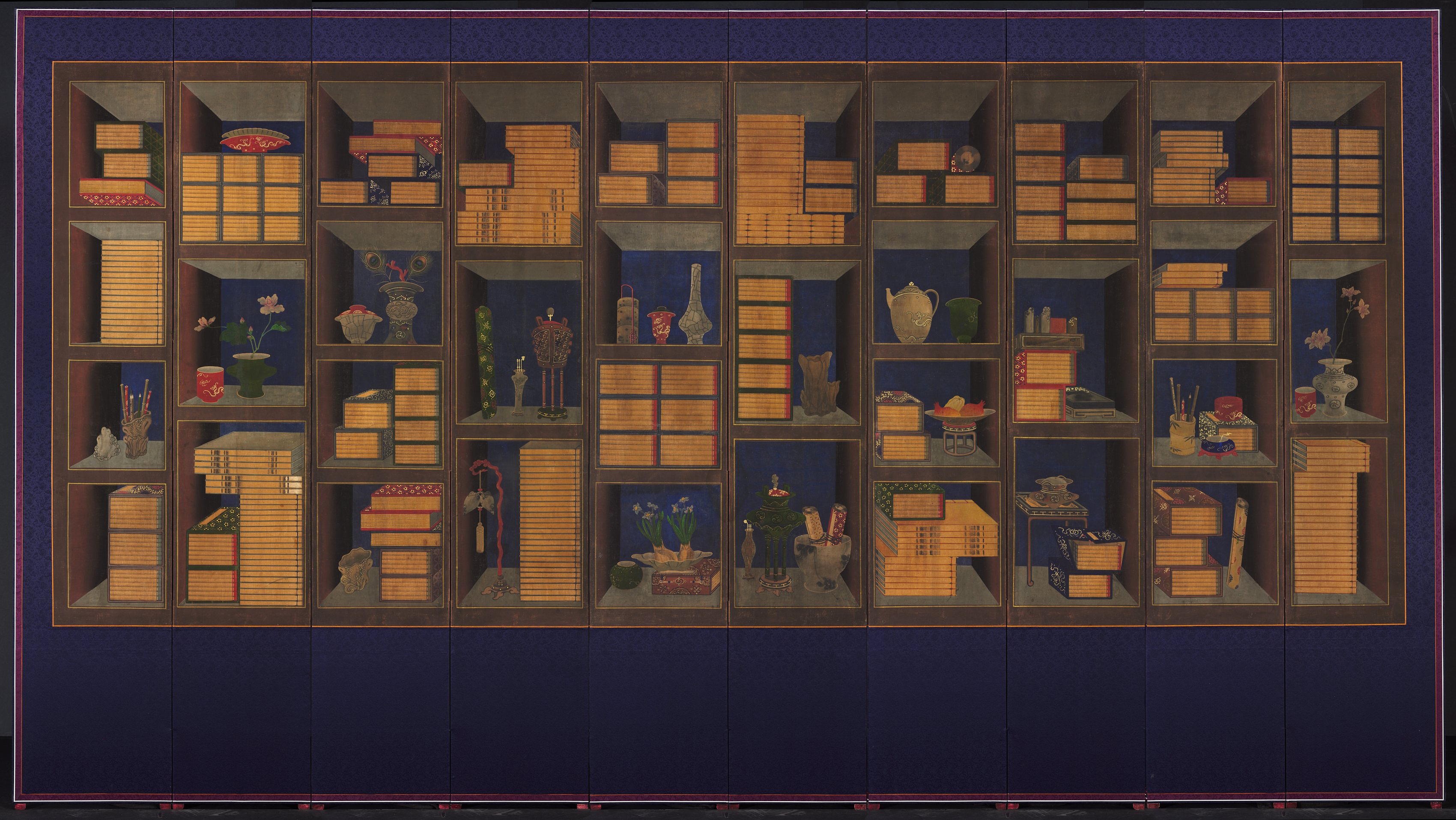
Yi Taek-gyun: Books and Scholars’ Accouterments
책가도 (冊架圖) (late 1800s)
Ten-panel folding screen; ink and color on silk
" … the research librarian remains a doubtful skeptic."
The Muse and I moved down the Portland sidewalk like the old hands we were, for she had just been recalling that I'd brought her to this neighborhood on her first visit, twenty-five years before. She said that she did not miss the bustle of living in a city, though, as we slipped around a clog of people doing jello shots and smoking at a sidewalk bar. The restaurant that used to tout its hundred beer taps now advertises its space for lease and this city seems weary and confused. From our hotel room, high atop an anonymous city center tower, I can look into the upper floors of a marvelous old tile-fronted office building, its upper floors just as empty as any abandoned warehouse, and no more elegant. New development continues, surrounded by vacancies and boarded up storefronts.
I feel enlivened by the variety, though, the juxtapositions attract my eye.
Blistering
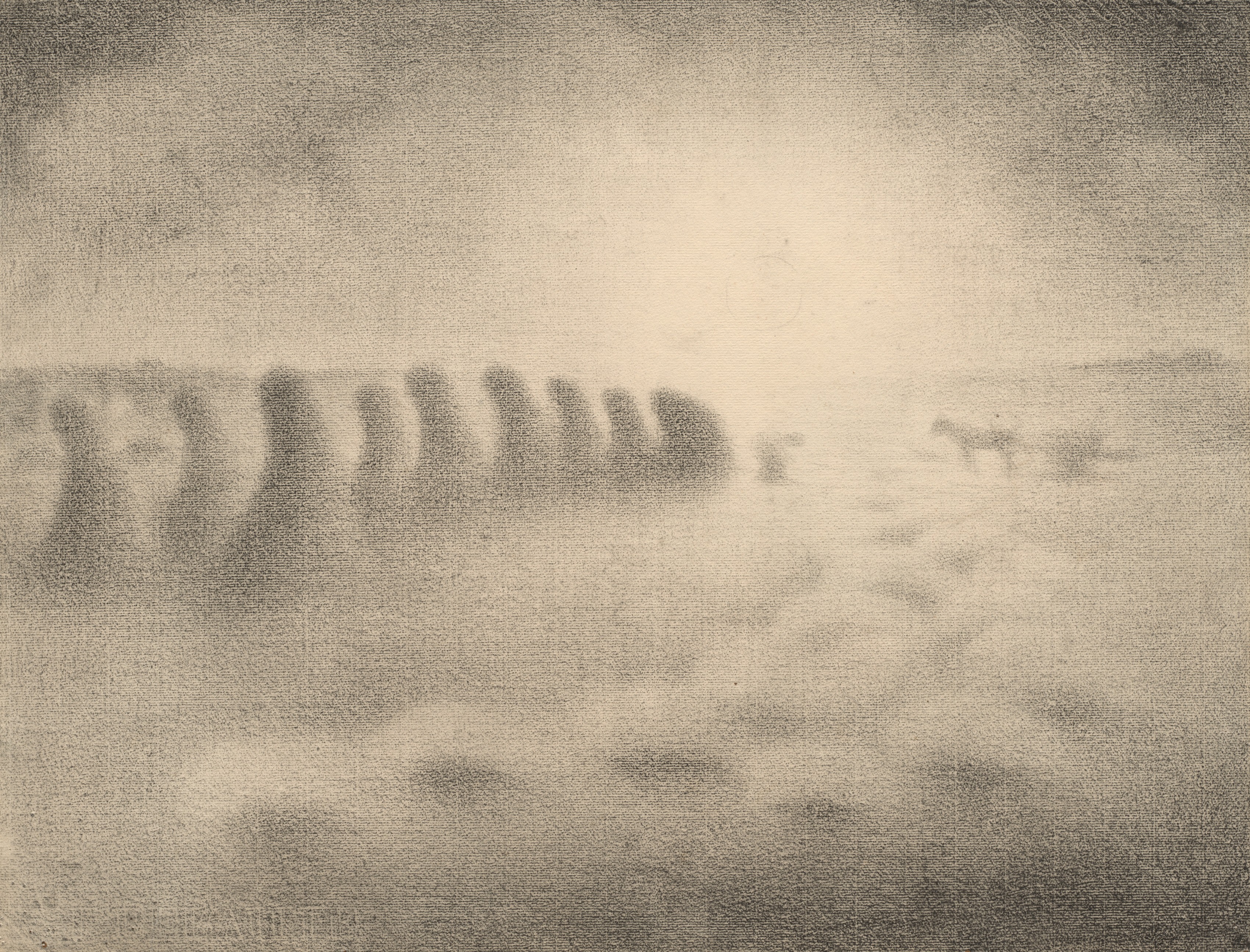
Charles Angrand: End of the Harvest (c.1892–1905)
"Nostalgia omits many details …"
As August draws near, the annual counterpoint to deepest, darkest Winter emerges, its opposite to polar, Blistering weather. It, like most opposites, produces a remarkably similar result to its mirror: doors and windows shut tight against the outside, a kind of hibernating happening in. By eight in the morning, it's become uncomfortable out there. We've already drawn the shades and turned up the air conditioning, and set the box fans blowing. The overnight low came just before sunrise and barely fell below eighty degrees Fahrenheit, 26C. It's Blistering.
I set sprinklers in darkness, running them until an hour after sunrise, when evaporation renders them wasteful.
Absolution
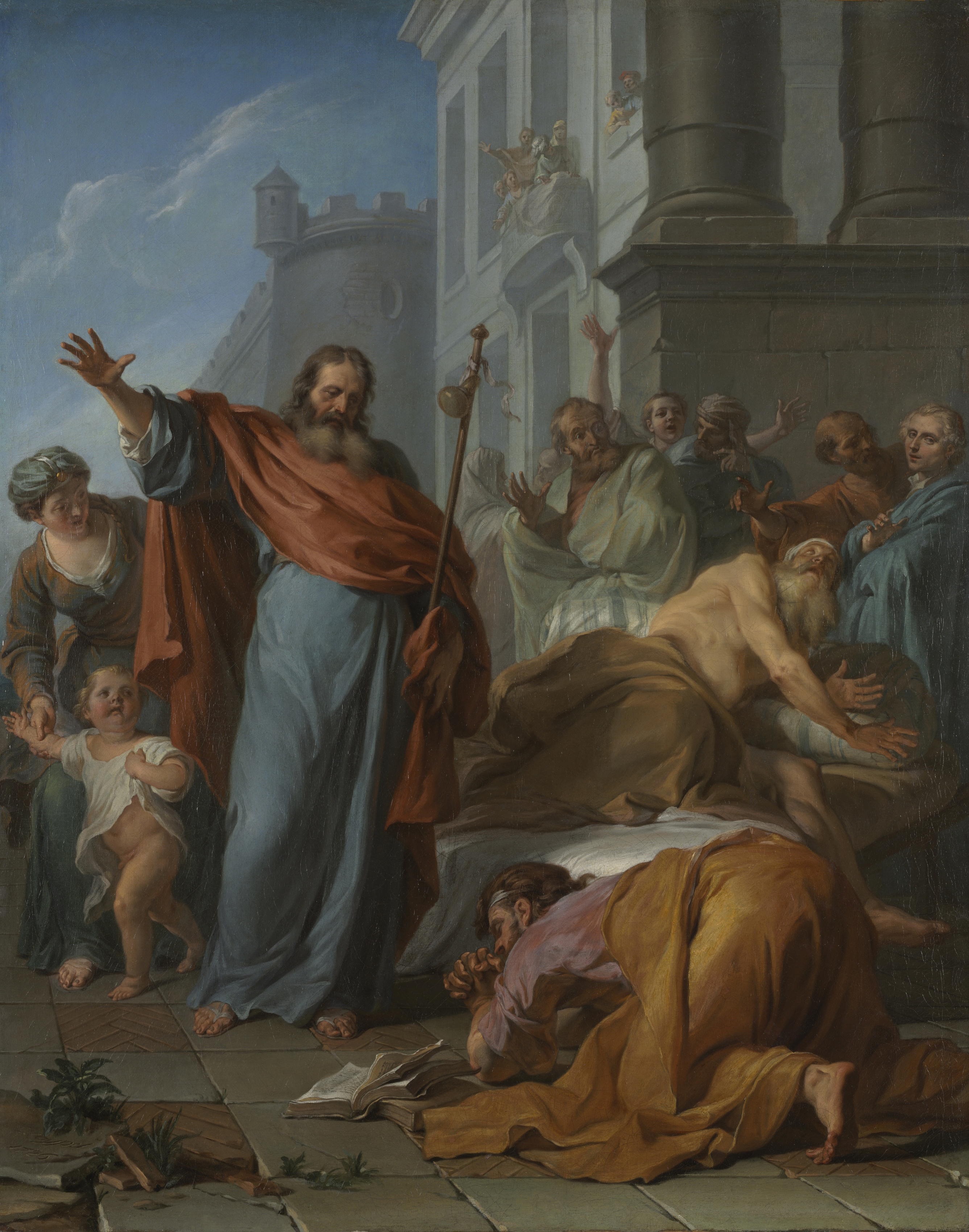
Noël Nicolas Coypel:
The Miracles of Saint James the Greater (1726)
"I can breathe again!"
Who seeks Absolution by going to the dentist? Who, that is, besides me? I hold a convoluted story about my recent relationship to dentistry, one which I'm uncertain I should share, which explains why I'm choosing to share it, under The One Must Speak What's Not Supposed To Be Spoken About Rule, one of my personal Ethical Responsibilities. That twinge suggesting I should stay mute on a subject too easily becomes an excuse to stifle myself and I'm reasonably certain that my purpose here might never have been to master self-stifling. I'm not struggling to justify disclosing embarrassingly inappropriate details, just something perhaps painfully necessary, a shortcoming and its accompanying redemption. An act of Absolution.
I do not believe that my primary purpose here was ever to pass judgement, either.
StrongLeader
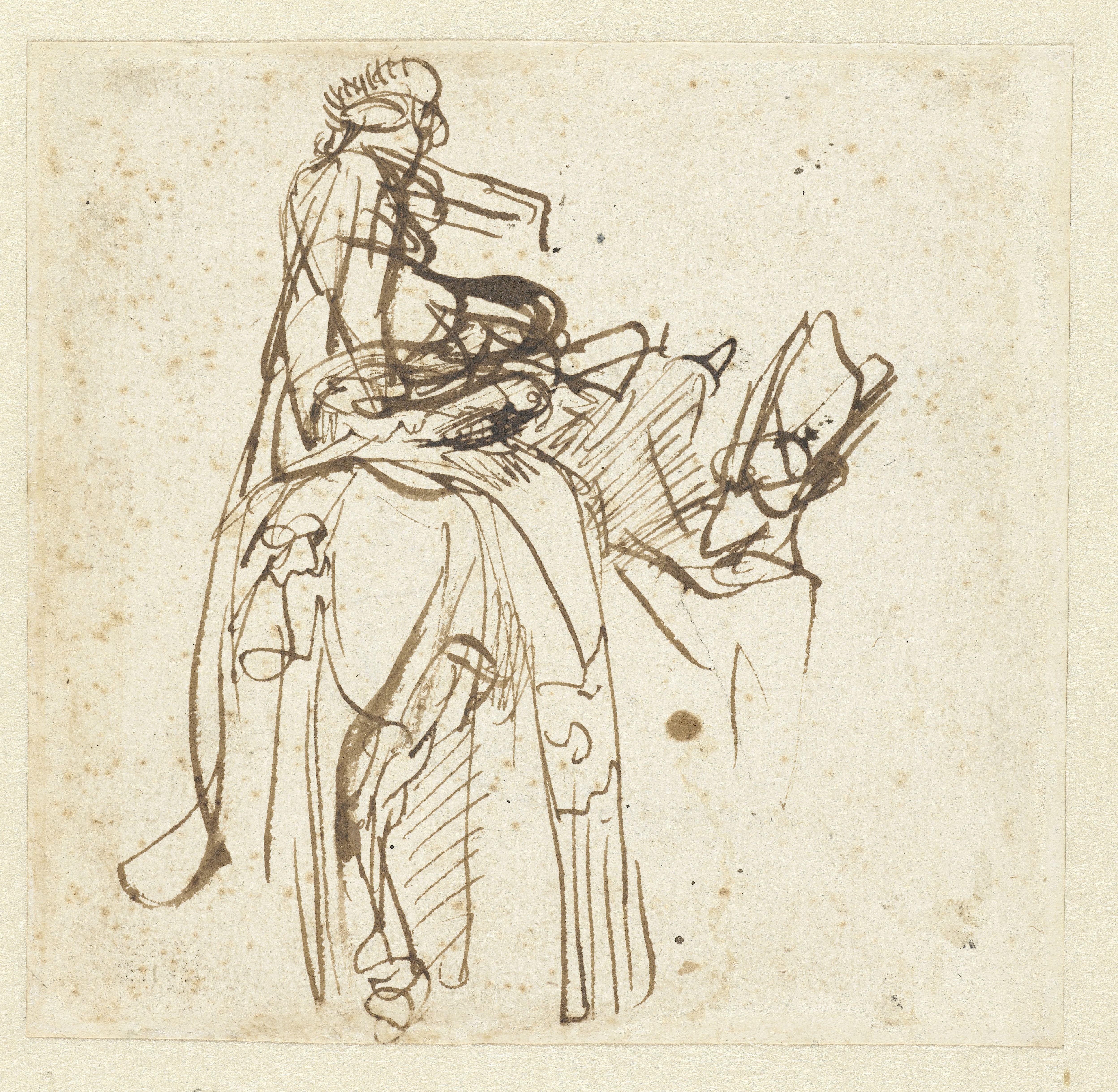
Rembrandt van Rijn:
Man Helping a Rider to Mount a Horse (c. 1640-41)
"Vote for the one not trying to impress you."
Lord, help us, please, resist the StrongLeader's seduction, for we do not need StrongLeaders. We need leaders who can do their freaking job without continually plotting strategies for getting away with breaking the law they swore to uphold. We do not need leaders who just make stuff up as they go along, who act upon their animal urges, who hold eternal grudges. We need leaders capable of leveling with themselves and their followers, ones who eschew the trappings of power, rather than those who seem to need to impress, anyone with mommy or daddy issues. We need clear-eyed adults, ones who've dealt with their stuff, ones who might have crashed and burned before, ones who remember who they are and were. We need magnanimous ones, ones willing to kneel before their followers, in service to their supporters, ones who won't pander to get ahead. Ones with a head on their shoulders and a heart in their chest. Ones for whom good enough is best.
Il Duce, Mussolini, was the prototypical StrongLeader.
Reverting

Jacob van Ruisdael:
Landscape with the Ruins of the Castle of Egmond (1650/55)
" … face being all grown up …"
Contrary to how I might appear to any naive observer, I have not quite grown up yet. I experience moments of maturity, sometimes stretching into full afternoons or evenings of it, but I remain capable off Reverting to earlier releases of myself with little provocation. Last evening, chopping garlic for supper, I sliced into a fingertip with the extra sharp chef's knife and instantly reverted back into a five year old child. I yelled for The Muse while rushing into the small bathroom off the kitchen where I grabbed a handful of Kleenex® and whimpered. I became essentially helpless for the balance of the evening. The Muse had to finish prepping the supper I had almost managed to finish preparing, even though it was clearly my evening to assemble supper. The Muse clucked over me, suggesting that I might need stitches, while I switched out tissues and waited for the worst of the bleeding to stop.
I felt inconsolable inside. No amount of care could have erased that error.
Failure

Paul Cezanne: The Basket of Apples (about 1893)
" … everyone eventually becomes."
There's nothing quite like being greeted at a restaurant's reception desk by the question, "Just you?" Of course the greeter means no insult, but The Muse and I always fein offense and ask, "Just? Are we not enough?" The greeter briefly blushes before going back to more important business, like where to seat these clowns. Our point being that nobody's ever "just" anything. We're much, much more and never simply one thing.
At my age, I can easily claim to have been a Failure, but not "just" a Failure, for I have also at times been a success.
Recipe
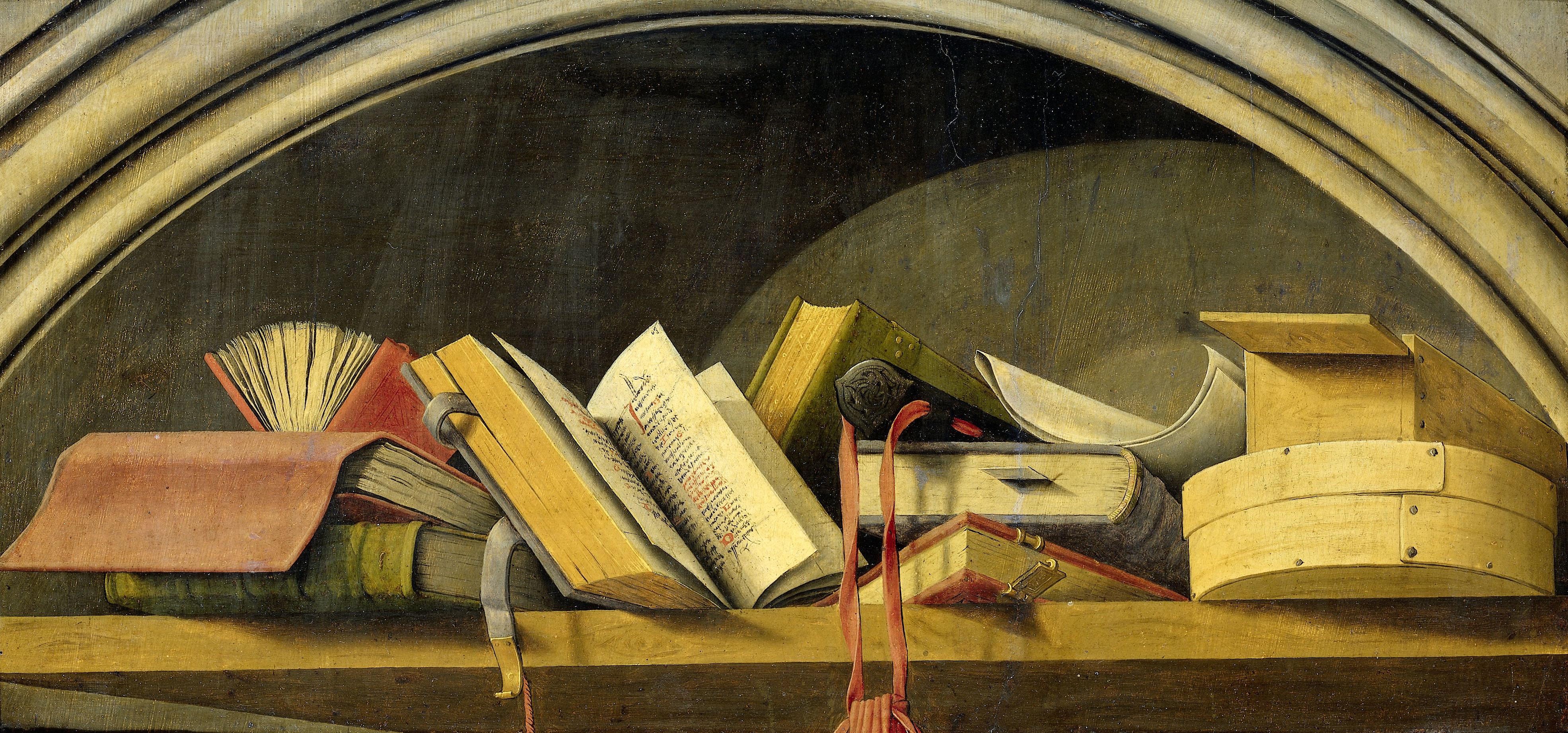
Barthélémy d'Eyck:
Still Life with Books in a Niche (1442 - 1445)
" … I will struggle to respond."
I am sometimes asked to recite a recipe for something I've made and I always struggle to respond because I don't usually use recipes. Oh, I might reference one to understand proportions—how much water to how much rice?—but I rarely very slavishly follow any instructions. Recipes seem the very epitome of frozen action, listing stuff as if stuff could be listed, sequencing actions as if sequence mattered. Consequently, I do not bake things because baking is too exacting, demanding slavish adherence to rules which successfully distill action into script. I'm not that kind of cook. For me, cooking seems more discovery than recitation. I'm never quite certain how to cook anything. Even if I've cooked something similar before, I've forgotten precisely how I prepared it and I did not write down my discoveries. I consequently do not cook the same thing once, let alone twice.
I am a man of simple tastes.
Unintentionals
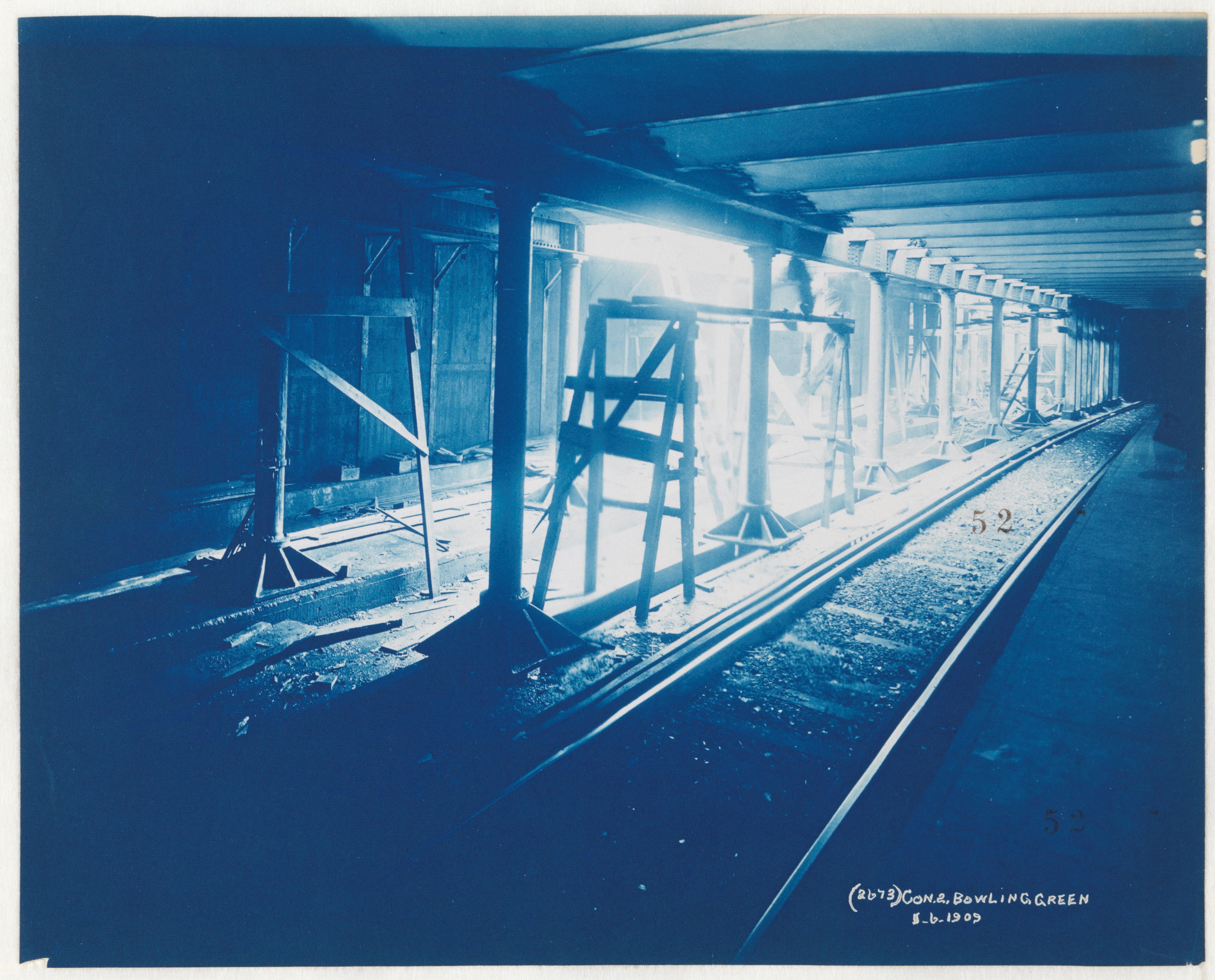
Grant W. Pullis (attributed to):
Construction of the New York Subway (1908)
"Might just as well embrace the inevitable."
My early mentors cautioned me about unintended consequences, apparently inescapable side effects of every significant effort. Setting out to change any world will very likely set into motion forces which will certainly change something else, too, and those side effect changes might well become the effort's legacy, like that county sheriff in coastal Oregon who decided to rid the beach of that rotting whale carcass with a little dynamite. He managed to cover a sizable crowd present to witness the transformation, including news cameras from Portland, with a thick patina of rotted blubber. This one act became the entirety of his legacy, thanks to a single unintended consequence.
Other Unintentionals seem possible, though, positive ones.
SacredDuty
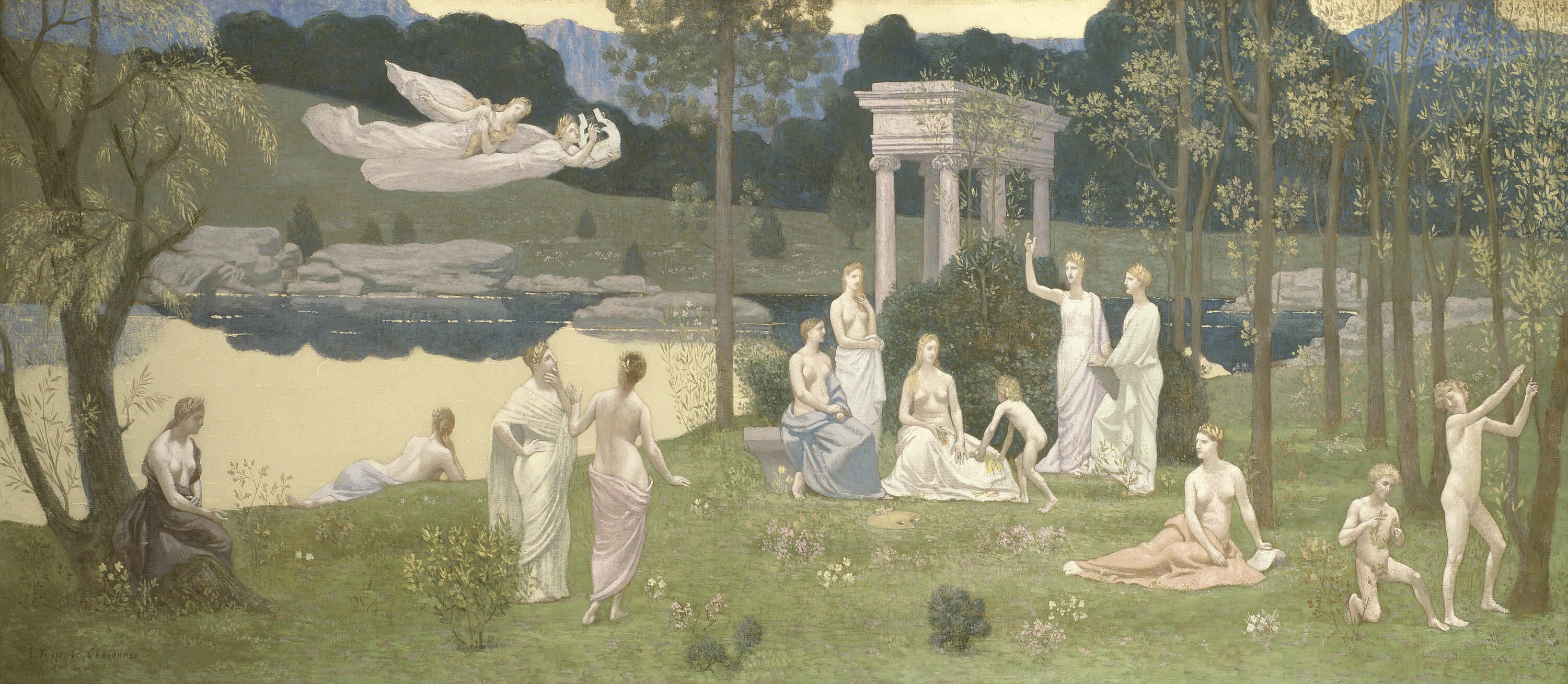
Pierre Puvis de Chavannes:
The Sacred Grove, Beloved of the Arts and the Muses (1884/89)
" … if any of us can still muster any of that within ourselves."
While it might seem unlikely from within anybody's daily routine, I believe that we each labor within an often tacit SacredDuty. It doesn't very much matter our occupation, we each hold a similar obligation, to each other, to ourselves, to our society, however wounded or unjust each might appear to be. We hold this SacredDuty for our own good and for the good of those around us, for the good of the universe, if you will, if I dare mention it. It probably doesn't matter where any individual acquires their sense of duty, their specific marching orders, though it matters much whether an individual received theirs and whether an individual managed to hold theirs sacred, to respect it and to actually attempt to live up to it. However we're each employed, we each report to the same supervisor, the same cruel overseer, and that ruler is us, ultimately our 'I', and no other, though we each might start with a mentor, an exemplar or two who attempt to clue us in to ourselves and our duty, and to our own sacred nature, with varying degrees of success.
The House Select Committee's Public Hearings on the Events of January 6, 2020, reminds me of the presence of such a thing as SacredDuty.
Nocturnal
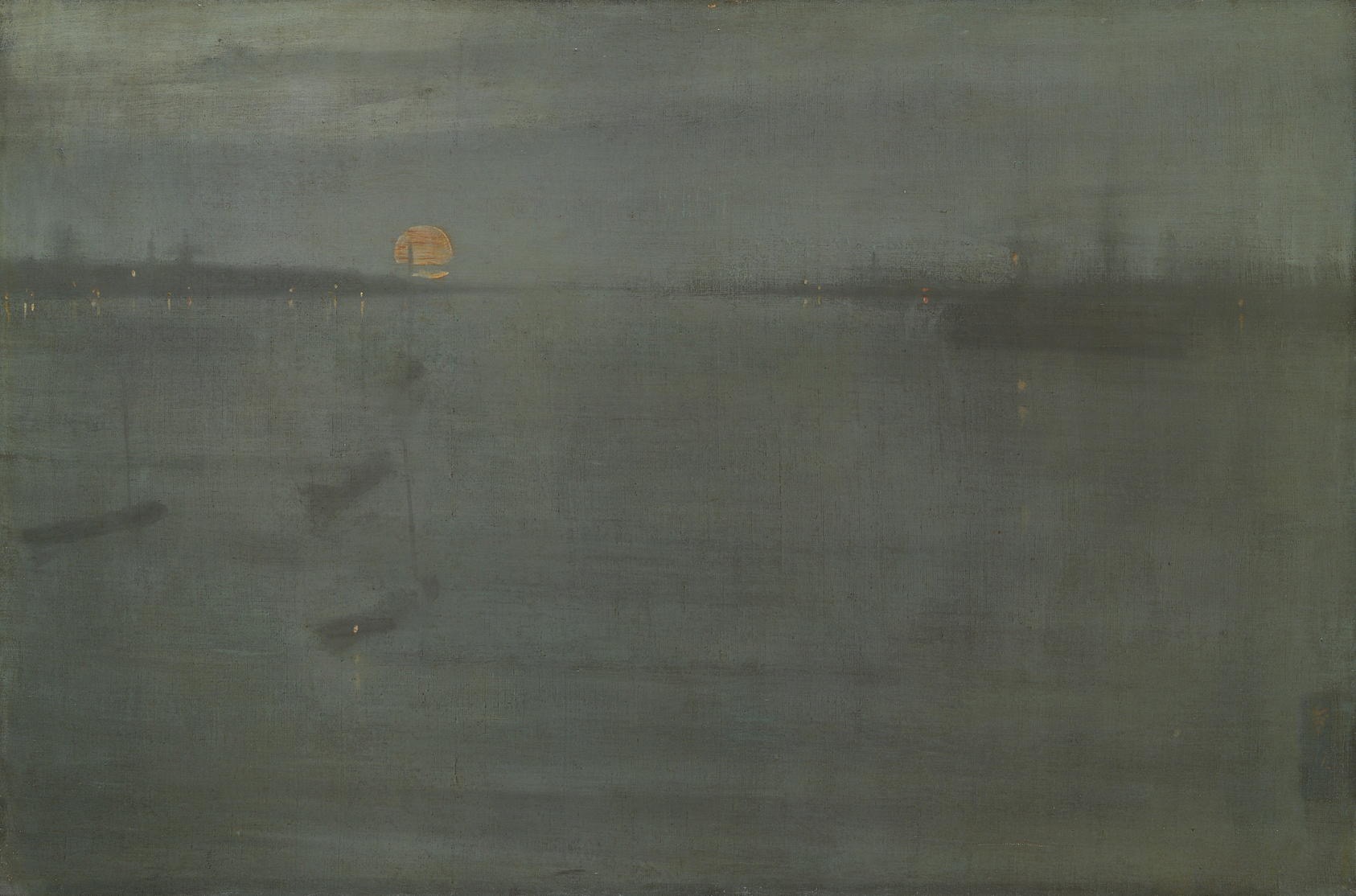
James McNeill Whistler:
Nocturne: Blue and Gold—Southampton Water (1872)
" … revel in the respite my predawn time brings."
In the highest summer, I turn Nocturnal. My usual habit of rising early becomes more than habitual but essential to the simple maintenance of life. Oh, the mornings remain mostly tolerable, at least until around ten, then the day degrades into near unbearable brightness and glare. Working out there becomes essentially impossible, for I will not, under any circumstances, wear either short-sleeved shirts or shorts, due to an unfortunate family history with sunlight. I exclusively wear long sleeves with cuffs buttoned against the sun and my usual long' legged jeans. My only concession to the season will likely be sockless feet. I'm not wearing sandals, either. I will also wear a broad-brimmed hat or one of my many havelocks. I'm as tucked up against the summer sun as any burqa wearer might be against temptation and sin. If I'm working, I'm also wearing gloves.
What do I wear when I go to the beach?
Inducing
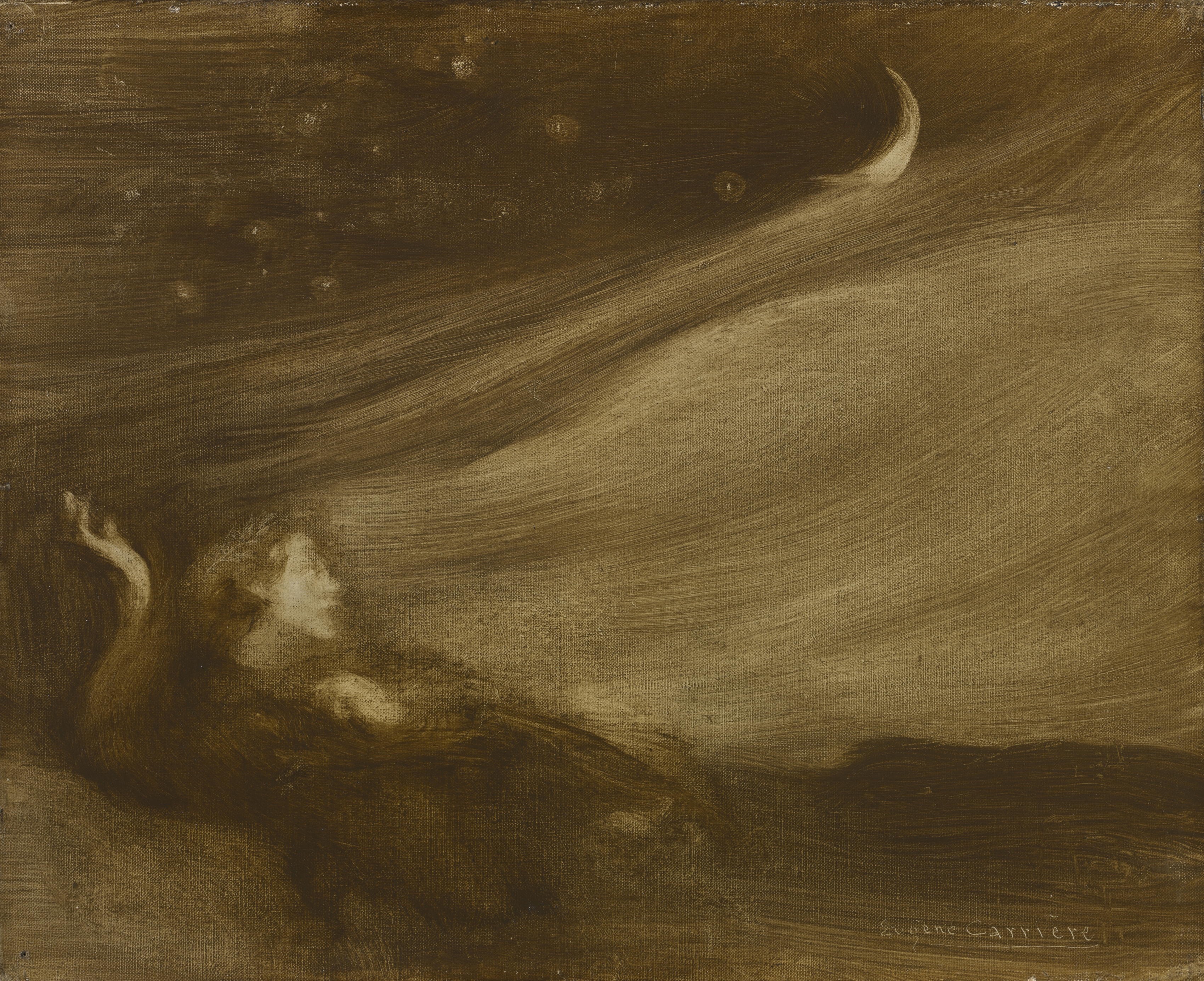
Eugène Carrière: The Contemplator (1901)
" … to thoroughly enjoy not being fully there."
I'm not so much working as actively Inducing, successful to the extent that my actions entrance me into satisfying action. I could not possibly have managed to complete the work I finished yesterday had I been fully present for the festivities. I was up and out early, climbing scaffolding again, finally finishing that busy slice of wall that had long been my dread and fear, my nemesis. I had by then conquered her. I'd even removed all by myself the rubber matting the electric company lineman had wrapped around the formerly terrifying incoming electric wires, an unimaginable act a few long months before. I was for that day, the self-acknowledged master of that stripe of wall. For my final act, I called in the cable company technician to replace the worn and weary-looking cable line coming down from its anchor, and to tuck it in around the conduit pipe and tie it down with fresh zip ties so it looked as nice as the rest of the wall. No outstanding anything after finishing a couple of final touch-up soirées up to the top and back down again. Then, my reward was tearing down that scaffolding to reconstruct it one click to the right.
I was crawling all over that wall like the monkey I am not.
EverydayMysteries

Paul Gauguin: The Call (1902)
"I just let these EverydayMysteries be …"
The older I grow, the less I seem to know for certain. This outcome surprises me, if only because I naively believed nearer the beginning of my life that I would become, if not older and wiser, at least older and more knowledgable, but this has not been my experience, unless I count stuff I've come to know for certain isn't reliably knowable. So the number of mysteries I juggle has greatly expanded while the number I manage to resolve has plummeted. I'm okay with this state of affairs if only because there seems to be nothing I can do about it other than accept and perhaps revel in it. It's just the way it is.
Earlier in my life, I dabbled with becoming somewhat of a detective, for I'd convinced myself that if I just applied myself, I could come to understand pretty much anything.
Touched
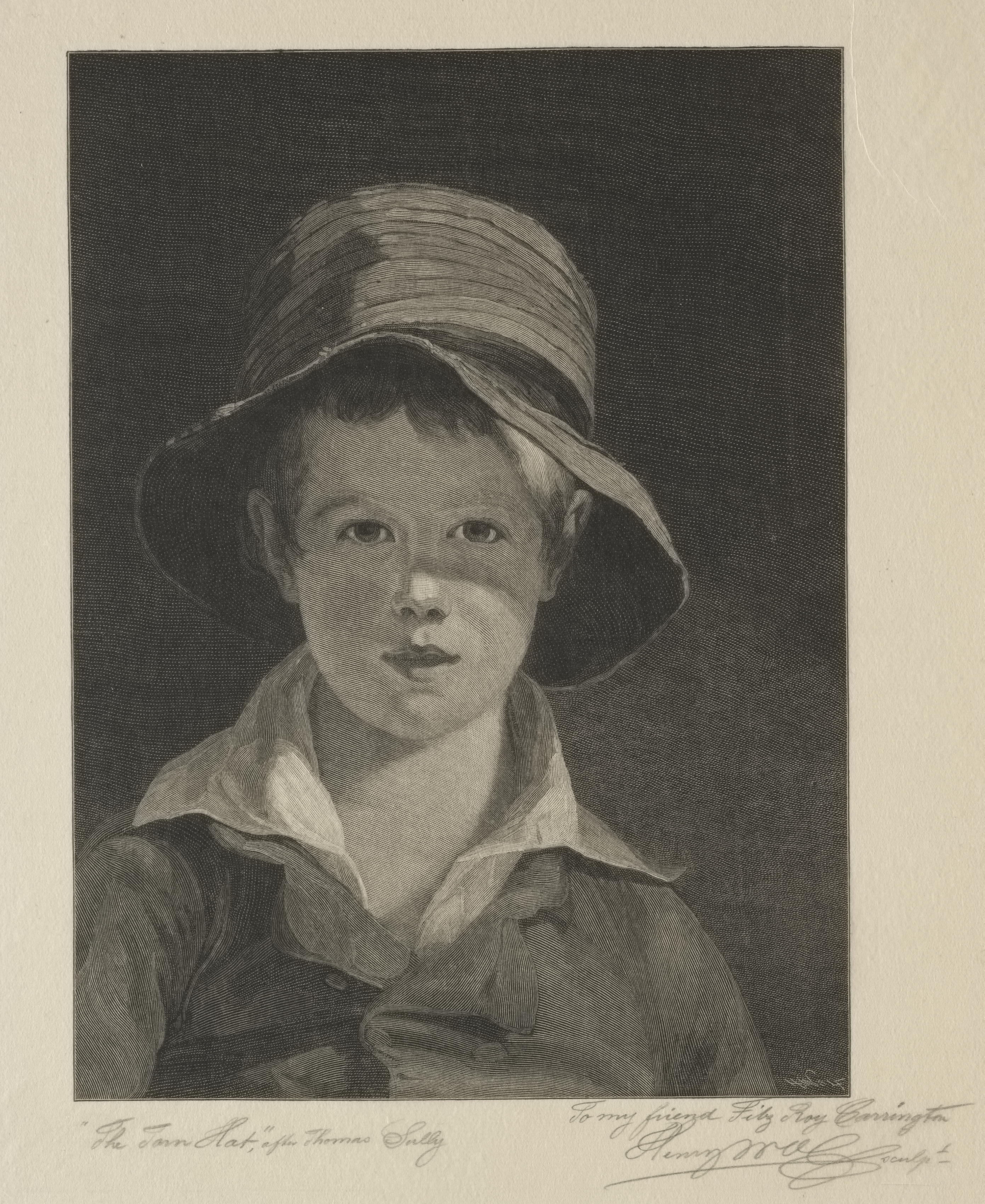
Henry Wolf: The Torn Hat (Date unknown)
"We're here to touch and to be Touched in return."
By the time I've nearly completed repainting another stripe of wall, I've Touched every square centimeter of it several times. Looking at The Villa from down the street, it seems unlikely from that distance that anyone ever touched even once every square centimeter of that looming hulk, let alone touched it several times. The property deed and mortgage papers never mention the unsettling fact that the actual price of owning this place would be the willingness, the patience, to do precisely that, or to hire another to do it for me. I entered into the agreement willingly and ignorantly. I suspect that nobody ever understands such implications in the moment when making such commitments. Those consequences come later, well after the initial thrall disperses. Then, anyone might find reason to accept that they must have been crazy to sign such a contract, then set about making it good, whatever the price.
While I busy myself touching several times every square centimeter of this place, this place is touching back, because Touched seems a two-way arrangement.
Torn
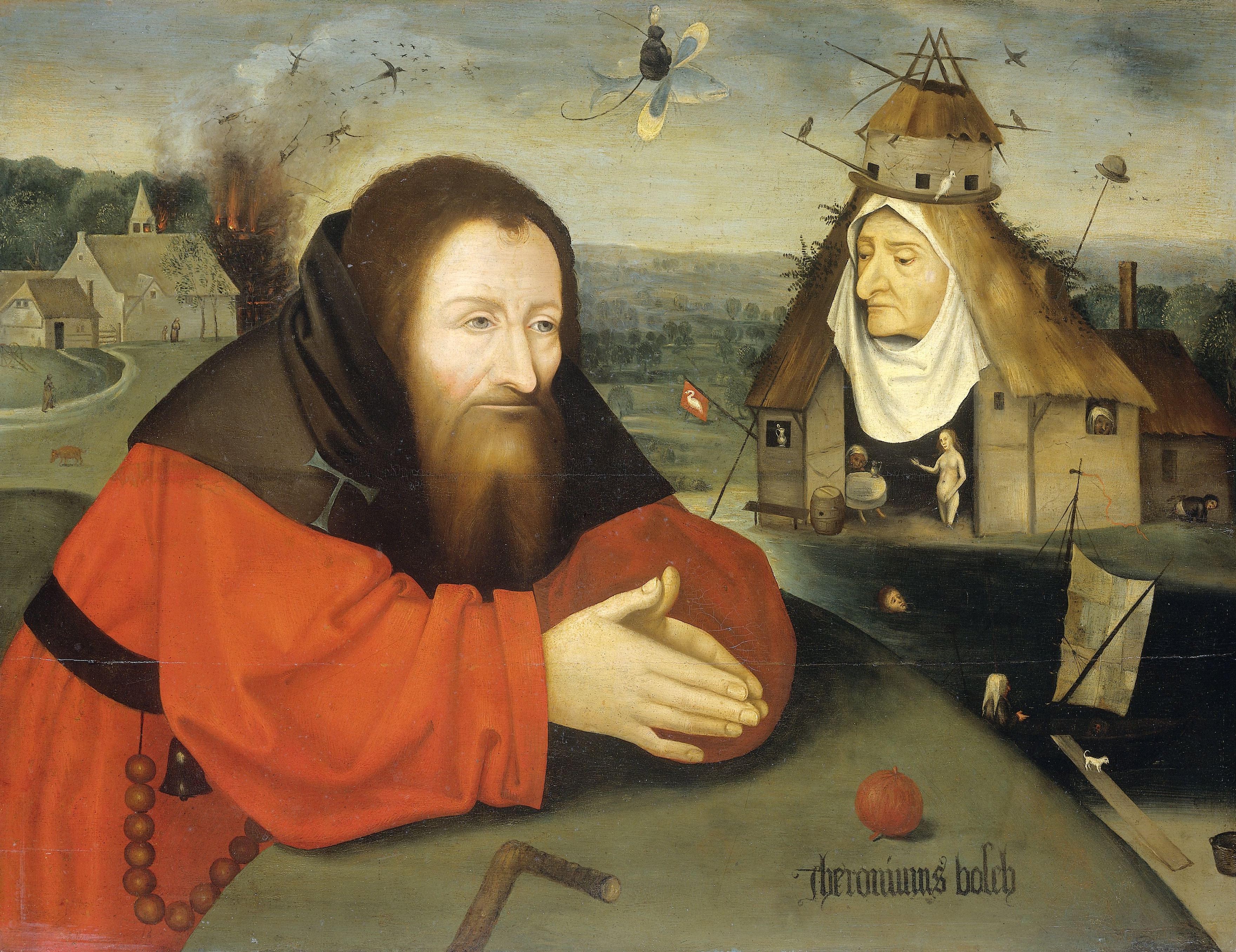
Jheronimus Bosch (manner of): The Temptation of St Anthony
(c. 1550 - c. 1600)
"… to better appreciate my many shortcomings."
"The requirements for design conflict and cannot be reconciled."
David Pye: The Nature of Design
When I'm painting, I'm also pining, for I shirk other responsibilities while fulfilling my repainting one. The rest of my little overwhelming universe does not freeze until I find time and focus to attend to them. They continue unsupervised, yellow-blooming clover conspiring to overtake my lawn, the annual purslane bloom taking root. The side of the house I'm painting is presently living up to my highest standards of maintenance while the rest of my existence slums it. I only have so much to contribute and, as David Pye reminds, the requirements conflict and cannot be reconciled, always have and always will.
The notion that I should be able to keep up, to not merely juggle all those chainsaws, but to simultaneously operate a hot half dozen of them, that seems to be the source of the problem.
Clusters
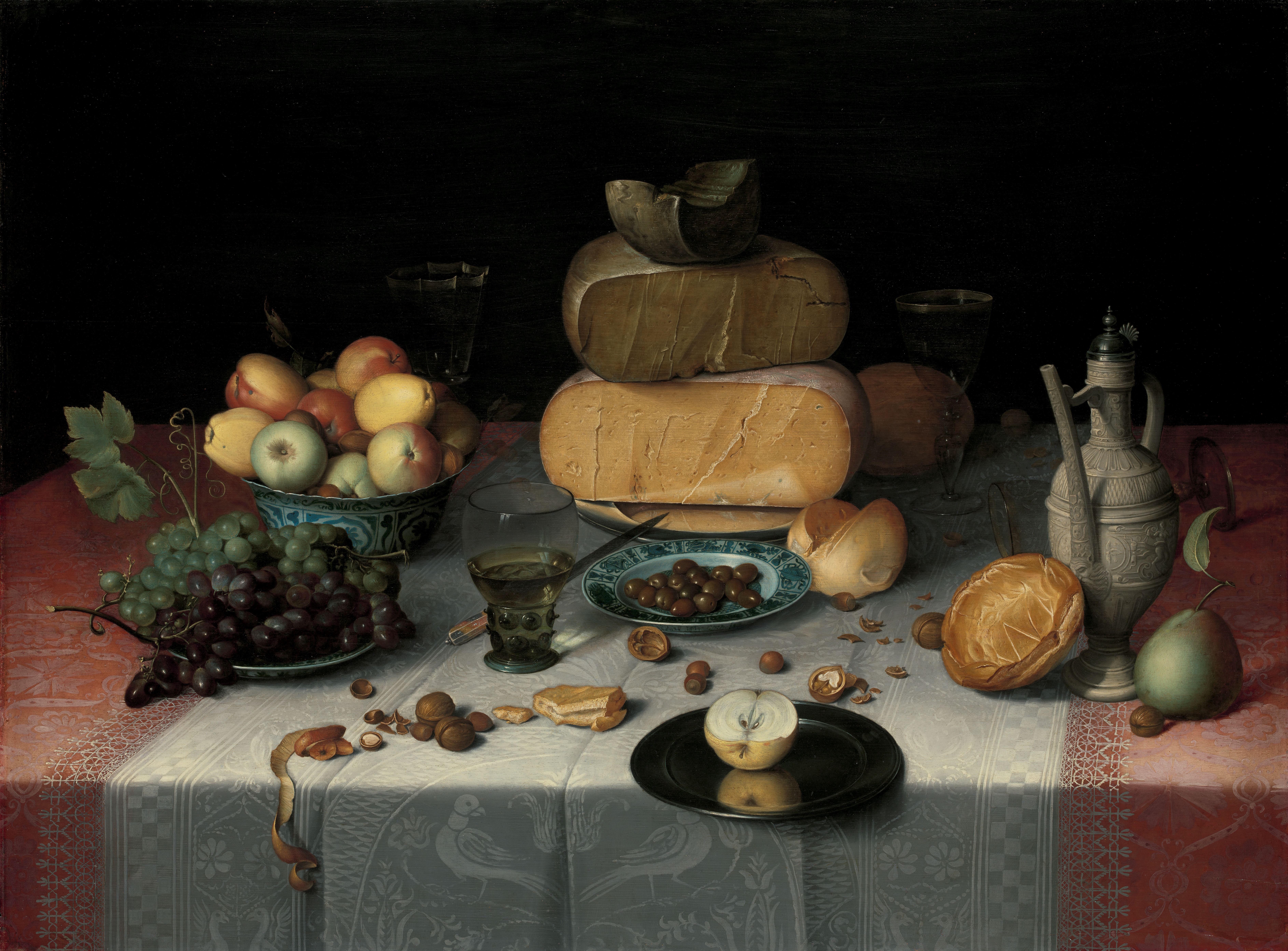
Floris Claesz van Dijck: Still Life with Cheese (c. 1615)
"For me, it's only sometimes something …"
It would be news to nobody if I reported that things tend to happen in Clusters. Nothing much will happen for the longest time before a single week will bring a flurry of activity. Often, stuff will break down together, as if unrelated stuff were secretly conspiring and dedicated to causing only occasional trouble. Visit one repair department and you'll probably visit a half dozen in quick succession. It might be a law of the universe guiding this sort of thing.
A week ago today, I managed to swipe my watch off my arm by bumping into a crosspiece on the scaffolding.
NightDrive
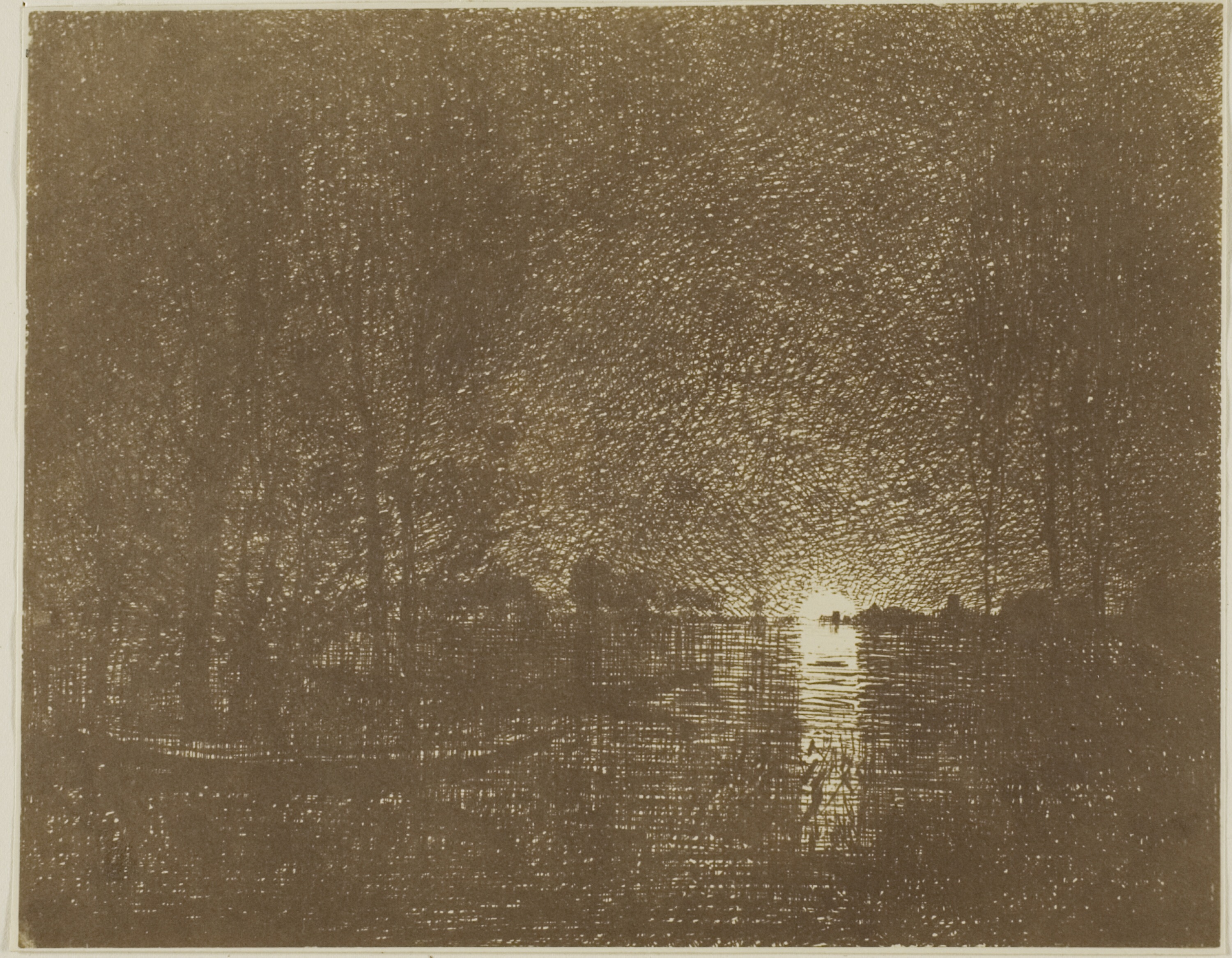
Charles François Daubigny: Night Effect (1862)
"Imagine how appreciative The Muse must have been!"
Of all of humankind's truly ingenious inventions, the headlight must certainly rank just below the bottom of the list, for headlights simply do not work for the purpose intended. Some do, indeed, light the way, but only paradoxically, for if they enable me to see, they blind everybody coming toward me, clearly violating the First, Do No Harm Clause of Design and Manufacture. A NightDrive easily turns into a life-threatening experience because of this one piece of so-called safety equipment. How would an automobile designer resolve this grave shortcoming? Maybe by switching to the infrared spectrum? How am I supposed to know? I'm just the victim of this design, not its inventor.
The Muse will insist that my complaint lies with the remnants of that cataract surgery I underwent four years ago this month.
CuttingIn
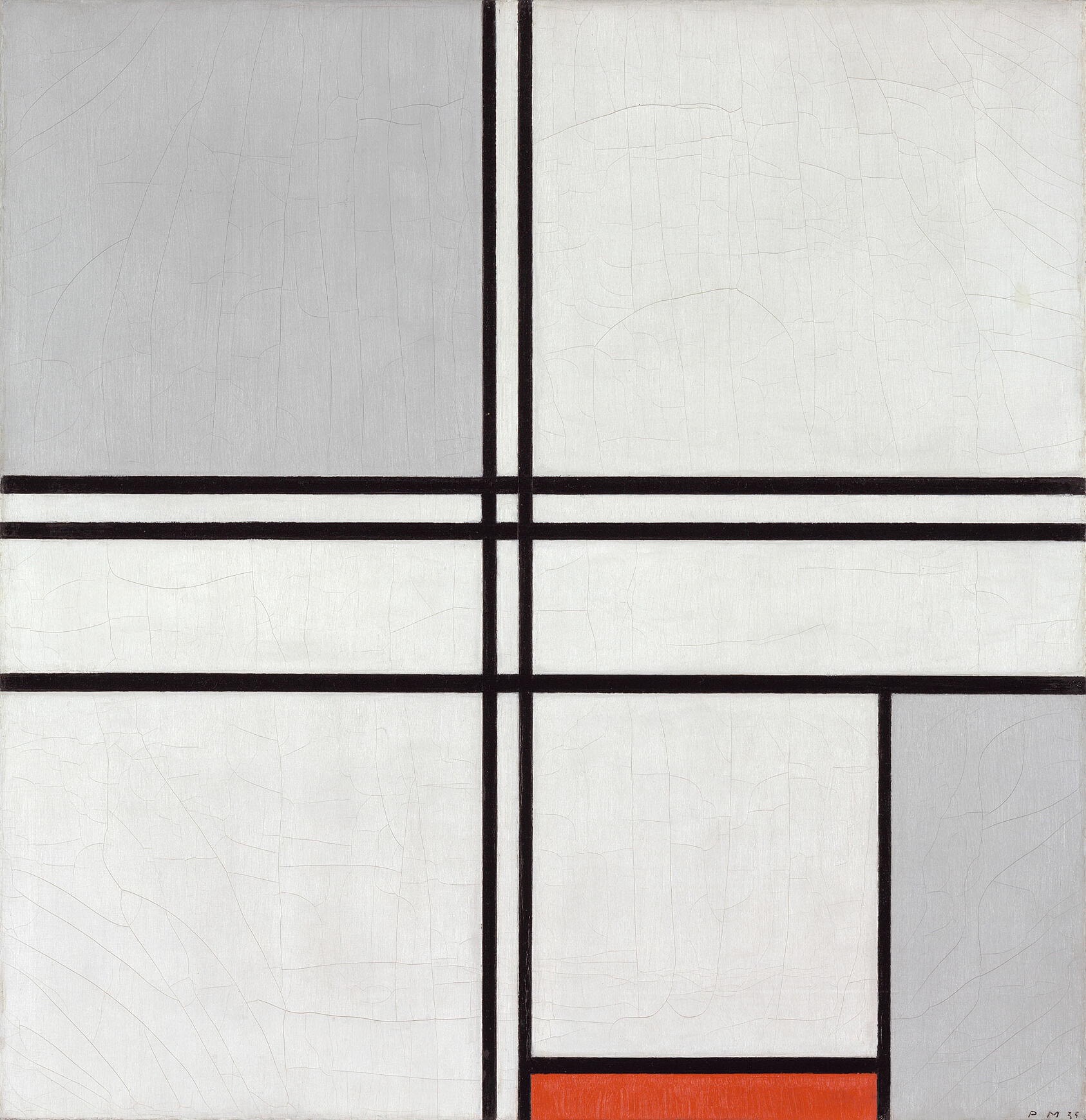
Piet Mondrian: Composition (No. 1) Gray-Red (1935)
"The library's a function of the quality of its shelves."
Prepping finished, priming finally done, the time comes for adding color. Up until then, everything's focused upon foundation, the sole purpose being to create a consistent surface: as smooth and uniform as possible. The prime coat serves as a proof of sorts, a test to determine if the surfaces have been sufficiently worked such that they might hold the promise of a decent-looking final finish. Of course it doesn't quite satisfy the discriminating eye, so that prime coating features a little back-sliding, some additional sanding, scraping, and filling. The eye always misses something the first few times through. At the point where color comes into play, the game changes. Before, I'm focused upon the broad plain of the surface. Edges between trim and wall color become meaningless. I work when priming as if there were no edges. Once the colors come out, the whole game becomes one of CuttingIn the fine lines separating the various trims and the base wall color.
Once finished, the eye will fail to register much variation on a properly prepared surface.
MadMen
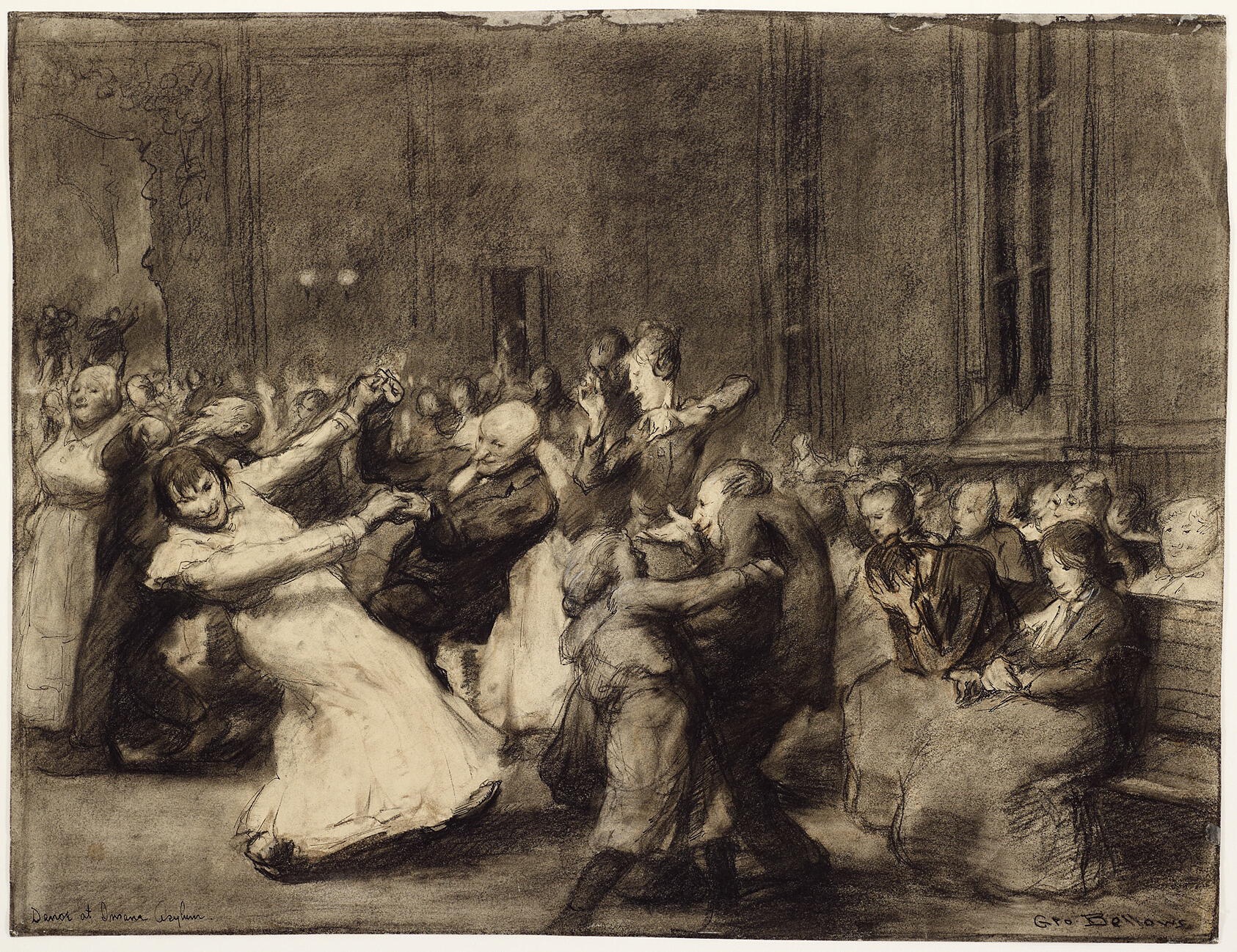
George Wesley Bellows: Dance at Insane Asylum (1907)
"You eventually became just another part of the problem …"
Who has not caught themself working for a crazy boss? Who has not found themself laboring within some crazy-making context? Who has not caught themself questioning their own sanity as a result? That questioning one's own sanity seems to be the one reliably meaningful way for validating one's own sanity, for the truly crazy never seem to question their own context, their own motives. So much seems absolutely presumed without questioning, and those presumptions can carry considerable weight and exert much subtle influence. It properly feels as though you never learned the rules and so seem especially unperceptive to yourself. The guy in charge poisons everyone's facility to properly assess reality. This seems primarily the work that MadMen accomplish. They warp the reality around them.
The challenge for those not actually crazy comes with the resulting crazy-making context.
FreshInfinity

NASA on July 11, 2022,
released the first full-color image
from the James Webb Space Telescope.
(NASA/AFP/Getty Images)
The new image is what is known as a “deep field” observation, with the telescope staring at what NASA called a “patch of sky approximately the size of a grain of sand held at arm’s length by someone on the ground.” NASA Administrator Bill Nelson as quoted in the July 12, 2022 Washington Post
"Would that our native sense of self-importance were not expanding faster than our universe."
The James Webb Space Telescope might be the largest rear view mirror ever produced. Capable of reflecting thirteen billion year old light, it provides formerly unattainable resolution. It represents just a next step, but one doozy of a step. In my lifetime, infinity has undergone multiple radical expansions, from the planetary outward, every few years, a deeper penetration became possible, and with each further immersion, the scale of my own existence, my problems, fell from the all-consuming into the infinitesimal. If the above image reveals what's visible out there through a grain of sand-sized lens, I understand in a new way just how incomprehensible this universe must be, by which I mean, that it's clear that I understand nothing at all about anything.
I consider this reset necessary and important, for without periodic refreshers on the scale we're actually dealing with, people can and do become subsumed with self-importance.
Dedicting
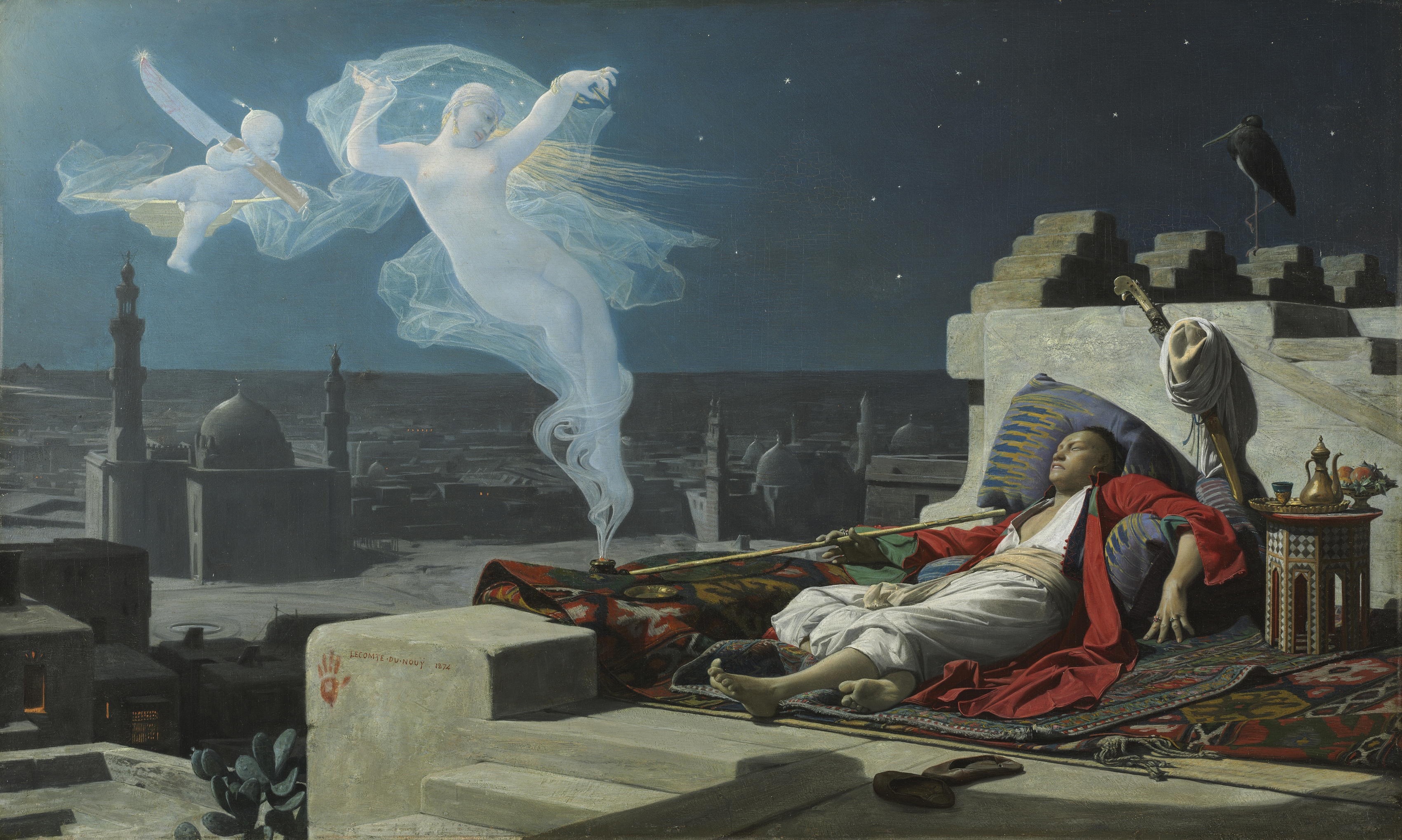
Jean Lecomte du Nouÿ: A Eunuch's Dream (1874)
"That exquisite poison has no substitutes …"
By my accounting, I stopped ingesting nicotine a year ago. I mention that now because it's only very recently occurred to me that I have been Dedicting ever since, that I have been attempting whatever the opposite of addiction might be. I'm uncertain if I have been successful, for the Dedicting continues. I considered calling this story Dedicted, except I doubt whether I'll ever experience a definitive moment when I no longer feel either that tug or its absence, either of which constitute a sort of continuing relationship with the substance. It might be true that nobody's ever through with any physically addictive stuff, and/or that stuff's never truly through with them, for the attraction seems to go both ways. Tobacco's superpower lies deeper than just in the souls of its admirers, but also in its apparent ability to attract individuals unto itself. It seems to find its most appreciative followers.
It was a special class I once belonged to, the smokers.
Preparings

Giovanni Battista Gaulli: Sketch for "The Four Prophets of Israel"
[for Il Gesù, Rome] (c. 1675-1677)
" … perfect's almost just as relative as done ever was."
Preparing should be considered an exclusively plural term, since preparing rarely seems complete after a first iteration. Much suffering results from a fundamental misunderstanding presuming that preparing or, indeed, preparation, should be completable with any single pass, when few can be; so few that for most every everyday intents or purposes, one should presume preparation's plural nature and think of preparing as a process better thought of as Preparings, presuming multiple iterations. One other catch lurks within this concept, and that relates to its fundamentally asymptotic nature. How many iterations prove necessary to complete Preparations? Think of this as a Fundamentally Unanswerable Question —aka FUQ (implied expletive intended)—because Preparings are rarely ended because they've achieved what might be easily recognized as completion. No, Preparings end only when the preparer decides they're done, a decision which might come at any time and for any of a wide variety of reasons.
Kurt, Our Master Painter, taught me this fundamental principle of painting, or he certainly tried to teach me this.
ReBeginning

Katsushika Hokusai: The Day Before the Beginning of Spring
(c. 1790) Publisher: Tsutaya Jūzaburōe
" … simply the sum of those restarts."
I imagine this morning that I am beginning, not merely beginning, but beginning again, ReBeginning. I've begun before. I've started way more than I've ever finished and I do not intend to correct that imbalance. Finishing seems way over-rated. The beginning's the thing. I figure that if I could only master beginning, I might be capable of anything, I might even, eventually, complete something, so I practice ReBeginning this morning in the belief —or is that a hope?—that this time, my efforts might finally amount to something.
I have been in the middle of the repainting project for so long that I can no longer remember the initiating premise for the work.
Exhausting
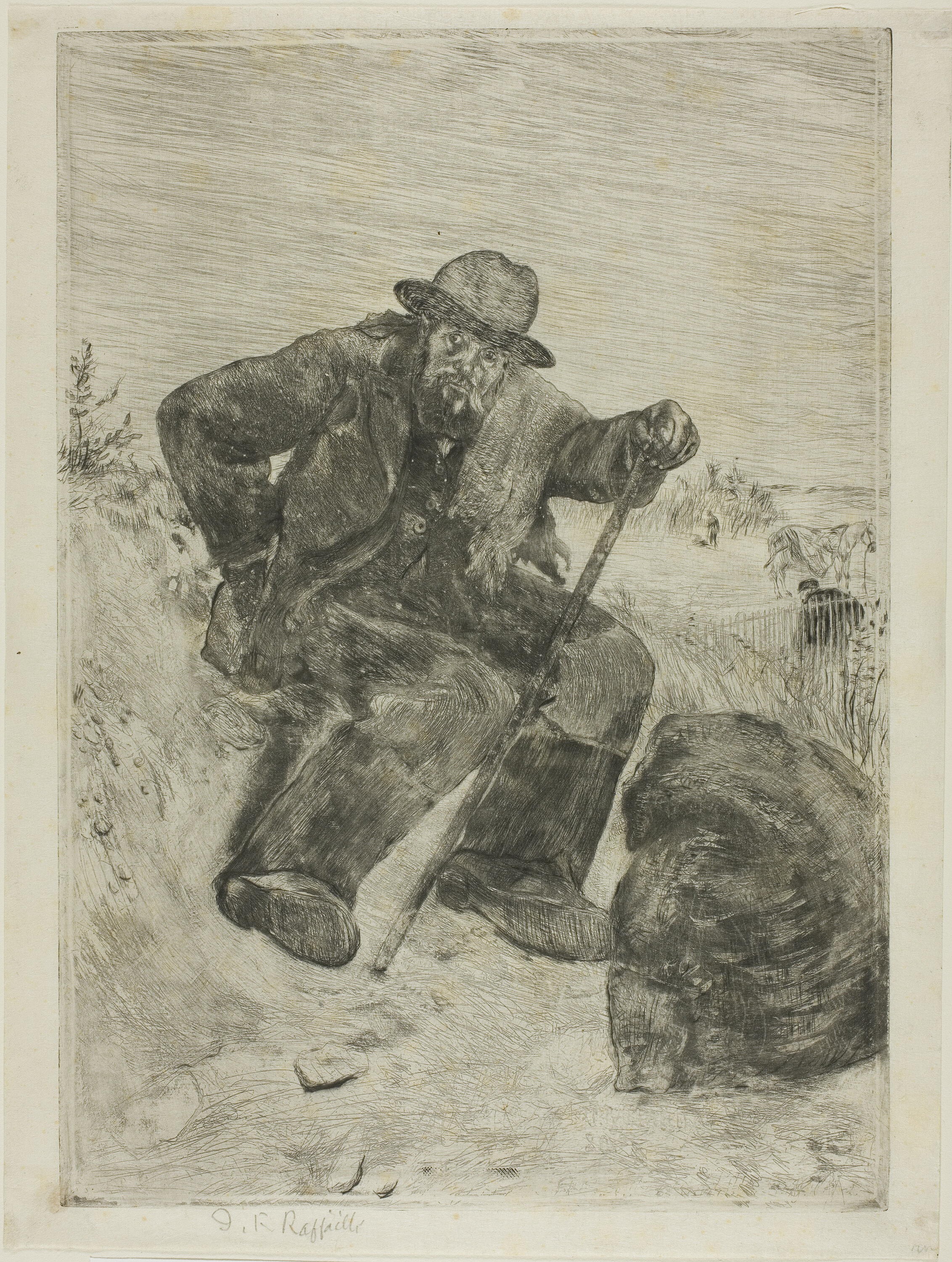
Jean François Raffaëlli: The Exhausted Ragpicker (1880)
" … simply too Exhausting to continue."
I've recently started noticing the weight this continuing Damned Pandemic exerts upon me. It's come to feel considerable, even unreasonable, and the newspaper promises even more of even more of the same, though the upcoming even more will continue becoming ever more highly evolved. It will become more communicable and craftier at evading our defenses, its offensive skills out-pacing our defenses. Since we must respond to defend, we're inevitably lagging competitors. Competing with this virus has been Exhausting, but insidiously so. It's never presented any particular hardship to me personally, for instance, to wear a mask in public or for this introvert to avoid gatherings. I rather enjoy going incognito and often chose not to go out into public places, though the option not to continue defending increasingly seems like a glaring omission. I'm just as free as I've ever been, just a little bit more constrained, yet the constraints, however small, seem increasingly limiting.
The experts label these feelings Pandemic Exhaustion and warn about its insidious influence.
HamSandwich
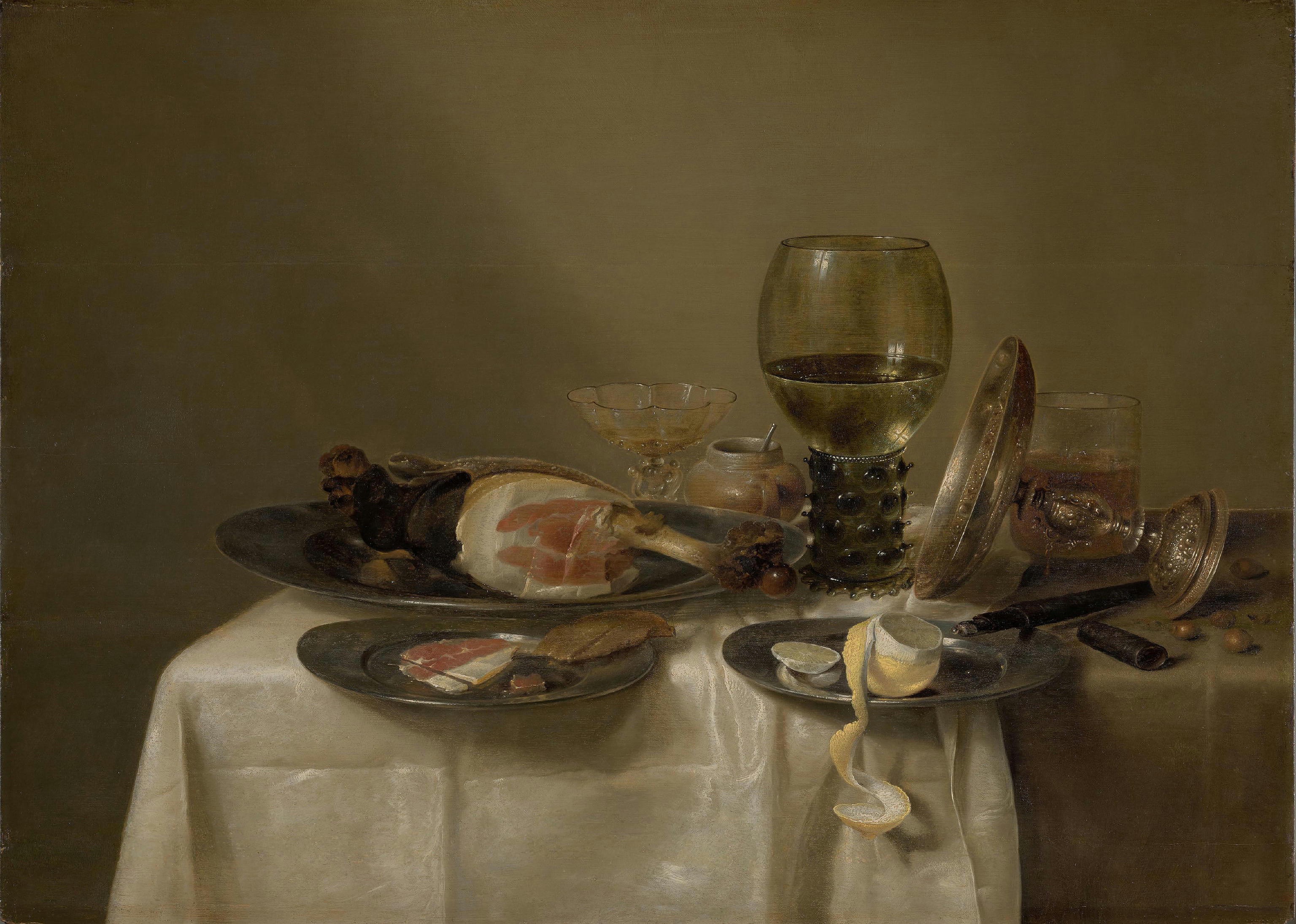
Willem Claesz. Heda: Still Life with Ham and a Roemer (1631-34)
" … the very stuff of despotism."
I will qualify what follows in advance, explaining that while I only rarely delve into what some might classify as political speech—as opposed to my usual more philosophical babble—I remain capable of engaging on the political level. Political talk rarely ages well, though today's story might straddle the political and philosophical, and might thereby consider itself more timeless than merely timely. Its topic seems timely, as this story has been aching for me to tell it. It's been my experience that while I'm avoiding telling a story that deeply desires to be told, whatever else I might produce tends to lack a certain substance. In that sense, it's like talking about what's not supposed to be talked about. Whatever else one attempts to talk about instead of what's not supposed to be talked about tends to miss the point, like an unmentionable elephant in the room sucking all the oxygen out of every alternative. I hope this story will prove to be pointed.
When Our Supreme Court codified the myth of fetal personhood into law, they managed to trivialize both the law and human life.
HolyDays
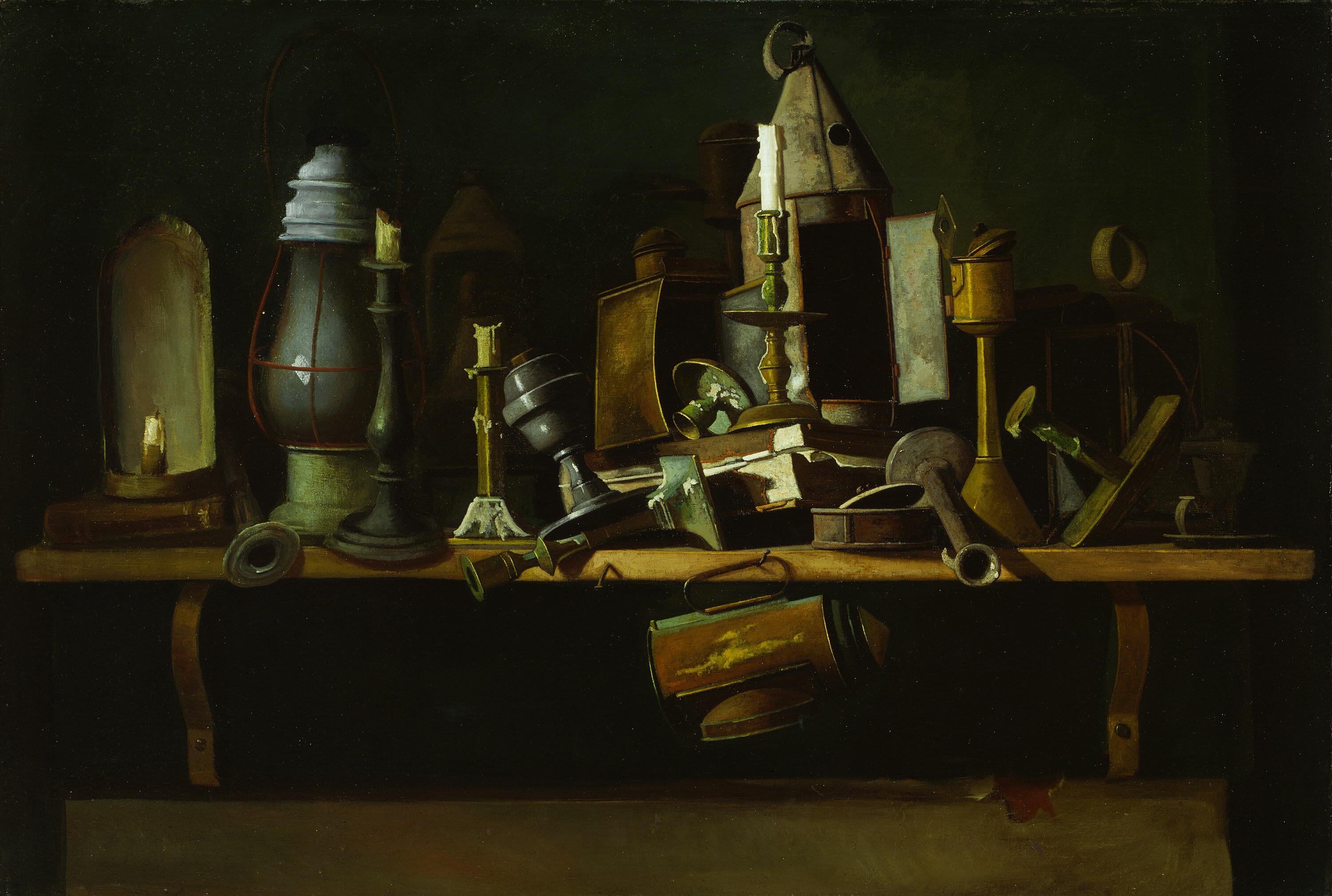
John F. Peto: Lights of Other Days (1906)
" … Have A Happy, anyway."
Us moderns do not celebrate HolyDays, we observe holidays instead. A Holiday serves as a secularized HolyDay such that even in the unlikely event that a Holiday started out as a HolyDay, most forms of actual religious observance, of humility, charity, or dignity will have been beaten out of any formal observance. One might succeed in privately genuflecting in the general direction of something genuinely sacred, but only if no spectacle's attempted. The spectacles belong solely to the secularists now, and are often performed with passion and fervor, but only in the general direction of mammon.
It's generally considered proper behavior to wish another "A Happy" on secular HolyDays, even if the greeting grates on one's soul.
Seasonal
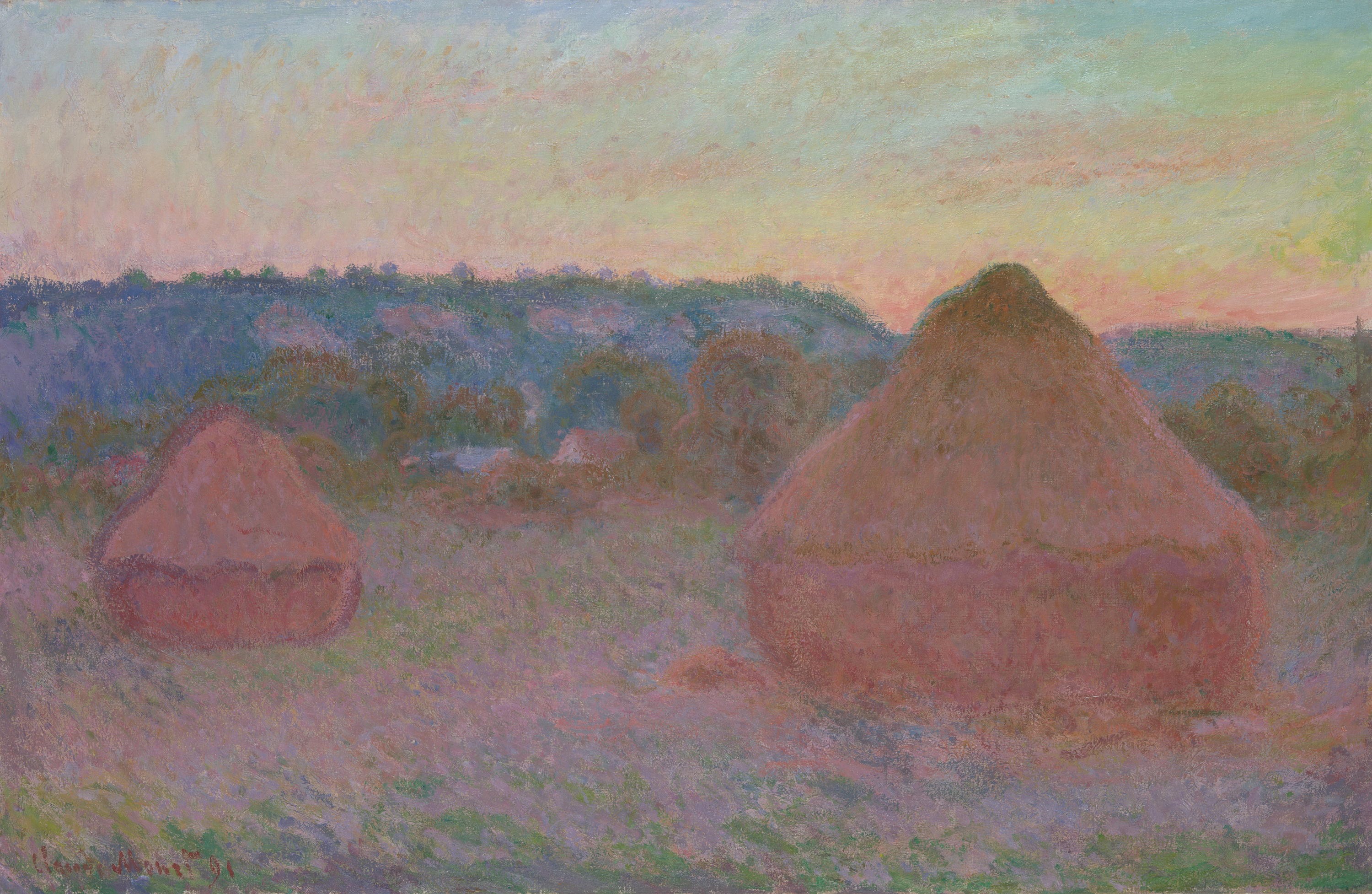
Claude Monet: Stacks of Wheat [End of Day, Autumn] (1890/91)
" … it's not usual, whatever that means."
Each season here carries certain markers which seem to suggest and regulate certain behaviors. We've been experiencing some unseasonal weather this year which has thrown off my usual anticipations and responses. I complained plenty this Spring about the rain which kept me off the scaffolding and away from my repainting project, even though we here have been cautioned to never, never, never complain about rain. This semi-arid region can always, always, always use more moisture and last year saw us limping through on much less than usual. Last summer, too little rain. This summer, a little too much so far. The wheat crop, which likes it hot and dry, has contracted rust this year. Crop dusters buzz around the valley trying to rectify that imbalance before harvest. When I step out onto the back deck at four o'clock in the morning to gauge the day's prospects, if the sky spits at me, I feel moved to surrender right then and perhaps just head back to bed. I expected Seasonal weather but received different instead.
I remain fully capable of adapting, but something's clearly missing whenever I'm forced to fallback into adaptation.
Being
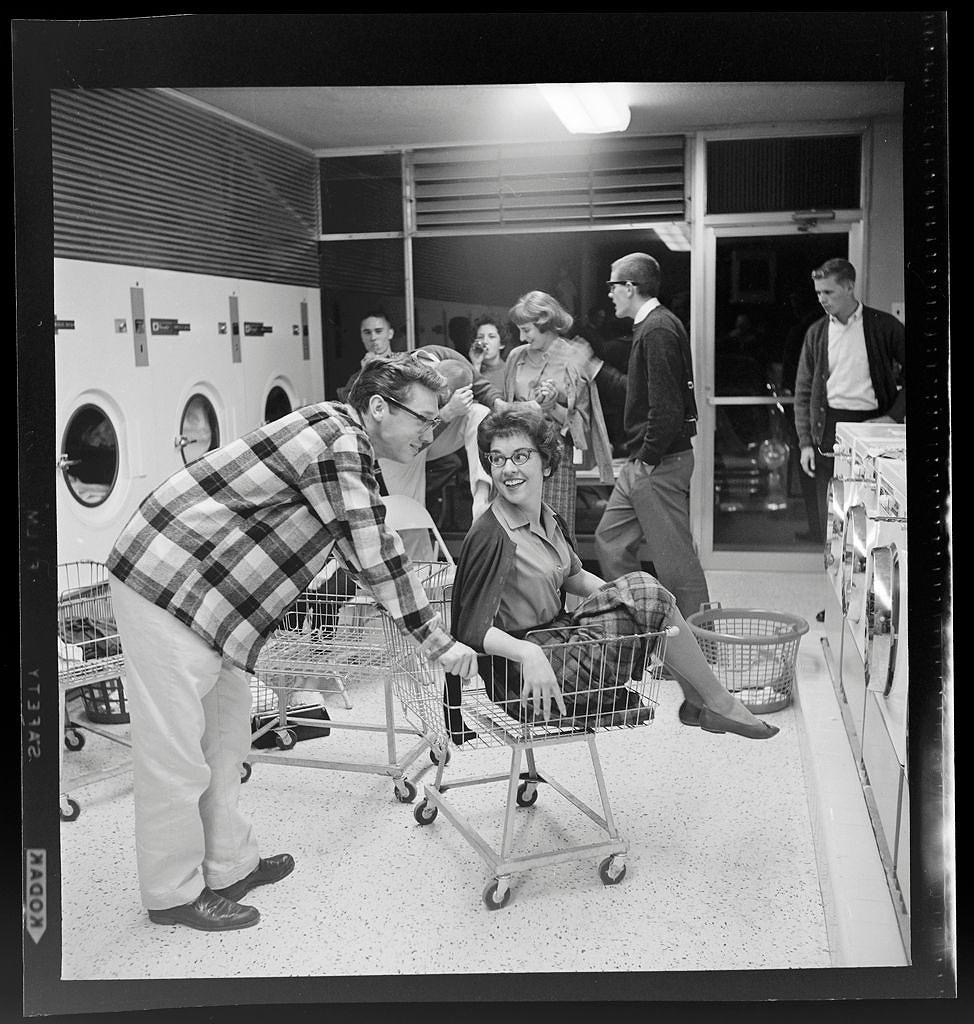
Jack Gould: Untitled (party in laundromat, woman being pushed in cart) (1957)
" … the perfect profession for me."
On these midsummer evenings, I like to sit in the garage with the roll-up door open, and watch. The scene before me, freshly painted siding boards poised on two by fours balanced atop old cat litter tubs, my pop-up paint shoppe, various roses and flowers, seems like a microcosm of my life. The Schooner's parked a little further down the driveway, laurel bush out-growing its space, the mock orange that refuses to bloom spreading out behind. The cats will pass through, stop for quick head scratches, then crawl beneath something and give themselves tongue baths. They'll watch, too.
This feels like the apotheosis of my Being.
Untouchables
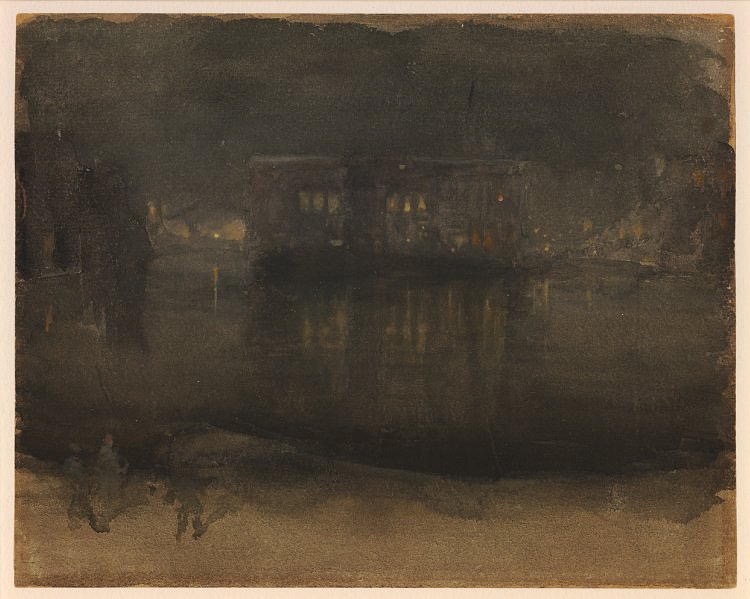
James McNeill Whistler: Amsterdam Nocturne (1883–1884)
"Just imagine how capable I'll one day feel …"
Now that The Muse and I have been back in The Villa for a year and a quarter, I'm noticing an increasing backlog of undone chores. Some appear to have become permanent and threaten to migrate out of Someday Likely To Get Done status into Untouchables, or apparent ones. These I will just consider to be features rather than problems, finished as they sit, however unsightly and indicting. Some will represent me coming to accept my limitations and others, my fundamentally lazy nature. A very few will permanently seem too daunting to ever seriously consider, bridges too far or too big of britches. However they became Untouchables, I will maintain them in that state with most of the dedication I also reserve for actually completing tasks. They will become as much a part of my identity as any actual accomplishment, that spot I can't see I never shave properly, the lucky shoes which will always look scuffed and worn and yet favorites. Idiot children.
I imagine that one day I might maintain a maintenance schedule as if I meant to maintain it.
OutOfTheBlue
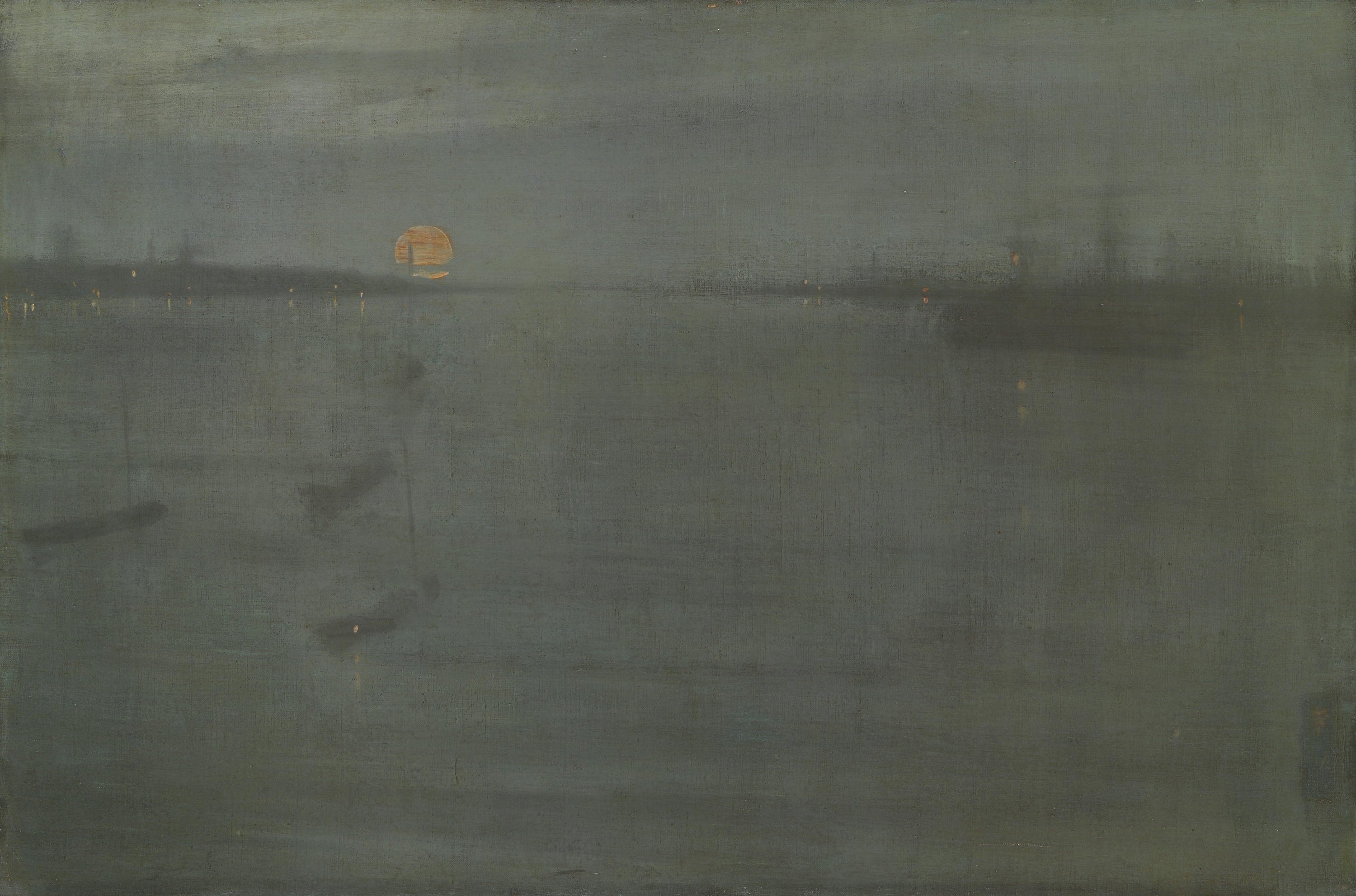
James McNeill Whistler: Nocturne: Blue and Gold—Southampton Water (1872)
" … an old acquaintance, an even older friend."
It should not be news to any of my frequent readers that I sometimes suffer through some blue periods. I can get down on myself and feel downright worthless, then spool into despair territory. Nothing all that scary, just part of any normal trajectory. I personally never trusted anyone who could endlessly keep it bright and sunny, optimistic even in the bleakest times. I preferred the more human leader rather than some statue to virtue, and strived to show that I was not made of stone or anything invulnerable. Still, I despise those days when I cannot find my way. I become as if I were three again, small and overwhelmed, unable to figure out how to play the games surrounding me. I often attempt to sleep through these times under the First, Do No Harm Rule. I'm no doctor, but I figure that sleep might just be the all-around best medicine for discouragement and depression.
Then, something happens. It almost doesn't matter what.


